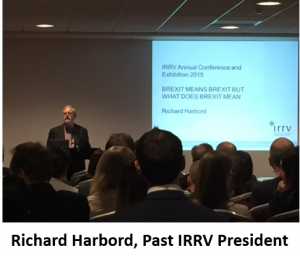 Richard Harbord, Managing Consultant from MRF UK Limited provided a fairly comprehensive overview on Brexit at this year’s IRRV Annual Conference. As the first member state to ever leave, he emphasised the enormity of the task ahead for those involved in any kind of exit strategy. Richard noted that the Prime Minister has stated that the UK will trigger Article 50 of the Lisbon Treaty before March 31st 2017. However matters may be somewhat complicated by the High Court’s recent decision, ruling that the Government cannot trigger Article 50 without parliamentary approval and a vote from MP’s.
Richard Harbord, Managing Consultant from MRF UK Limited provided a fairly comprehensive overview on Brexit at this year’s IRRV Annual Conference. As the first member state to ever leave, he emphasised the enormity of the task ahead for those involved in any kind of exit strategy. Richard noted that the Prime Minister has stated that the UK will trigger Article 50 of the Lisbon Treaty before March 31st 2017. However matters may be somewhat complicated by the High Court’s recent decision, ruling that the Government cannot trigger Article 50 without parliamentary approval and a vote from MP’s.
What happens next
If and when Article 50 is triggered a timeline of two years has been laid out to leave regardless of whether negotiations have been completed. Richard also commented on the Great Repeal Bill which focuses on ending the European Unions legal supremacy in the UK by converting all EU requirements into British Law. Essentially every bit of EU regulation will disappear from the statute book and reappear back in the UK Legislation book. Over a significant period of time which could last up to ten years, each piece of legislation will need to be discussed and a decision made whether to keep it or drop it. Everything we do which is contained in an EU directive will entail a massive effort to extract ourselves, this coupled with the fact that we haven’t negotiated a trade agreement for 40 years, means we have relatively few Civil Servants with expertise in this area, further complicating the issue.
Brexit Scenarios
Richard also talked about a number of Brexit scenarios. There is the option of a soft exit, adopting the Norwegian model whereby we would still have access to the single market, creating a tariff-free level playing field for goods, services and capital. This model would also enable freedom of movement for EU citizens but still require a contribution to the EU budget and most EU laws would still apply.
Hard Brexit
In contrast a harder Brexit would mean the UK leaving the single market, more control over migration with no contributions being made to the EU budget, no application of EU law and the UK negotiating their own trade deals.
British Sovereignty
Of course, these are the two extremes and there are options which exist that lie in between. Ministers have made it clear however that they would be willing to give up access to the Single Market to regain British sovereignty, in this instance it is more likely we will have to trade under World Trade Organisation (WTO) rules for a time until we can negotiate separate deals. The problem with this is that WTO applies tariffs to trade whereas the Single Market has none, meaning for a period of time the cost of goods and services will increase in areas like import tariffs.
Financial Sector Passporting
A number of other issues will be faced by the UK such as financial sector passporting rights and the ability to carry out financial transactions across Europe without restriction or the need to negotiate separate authorisations from every other member state.
EU citizen status
The status of EU citizens in the UK and UK citizens working and residing elsewhere in the EU is also a cause for concern. Richard noted that the NHS alone relied on some 935,000 employees with EU/migrant status, if they lose the employment rights of the EU, will the UK still be regarded as an attractive place to work, particularly with regards to currency fluctuations? We rely on many overseas workers to do those jobs that others are just not willing to do, so again we need to consider likely repercussions for the UK.
With Brexit, Richard believes Scotland and Northern Ireland will lose various funds and support grants from the EU and will be more likely to make demands on the UK government to fill this shortfall, putting more pressure on funding for various projects.
EU funding
Richard noted we contribute £11.3billion in funding as a member of the EU and in return we receive around £7billion with at least 56% of this spent on agricultural subsidies and a further 24% spent on regional policies.
In conclusion, there appears to be no definitive strategy or approach at present for Brexit and until more details emerge it will be hard to assess the impact at a local government level.
